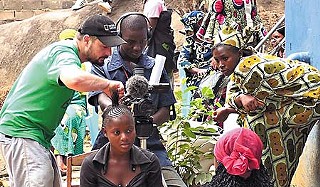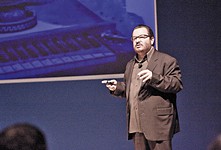Reporting From the Front Lines
New media in troubled lands
By Belinda Acosta, Fri., March 4, 2011
The attack on CNN's Anderson Cooper as he covered the Egyptian uprising was for many the first – or at least the most public – indicator that the "peaceful revolution" had a dark side. Soon thereafter, news of the brutal sexual assault and beating of CBS news correspondent Lara Logan broke, followed by reports of attacks on other, lesser-known news gatherers. It was a sobering reminder that journalists are also casualties of war.
As editorial director of El Siglo de Torreón in Coahuila, Mexico, Javier Garza and his colleagues live with the constant threat of violence. Drug cartels have not only disrupted daily life in parts of Mexico; they have explicitly targeted journalists and news organizations that have published reports they didn't like.
"Yeah, sometimes I think, 'This is a great story – too bad we can't publish it,'" Garza said in a Skype interview from his office in Torreón. The safety of his reporters is Garza's first concern. There is also the ongoing issue of how to get sources to speak on the record. "Reporting has become so complicated," he said. "Secrecy [caused by fear] makes it hard to get to the bottom of something, but if we can't confirm, we can't publish. And if we feel that something is going to put us in danger, we don't publish. I think the public has come to understand that."
New media – Twitter, Facebook, blogs – may provide a solution. "Blogs don't have mastheads," Garza said. "Nobody can go shoot a Facebook page." However, new media is not without its complications. On the plus side: immediacy, as well as the opportunity to broadcast information that conventional media may have overlooked. The downside? Misinformation is easily spread by anyone not following basic journalistic standards. And it's not only citizen journalists using social media. Tweets by cartel members announcing a shoot-out in one part of town may divert attention from criminal activity in another part of town, while also encouraging a culture of fear.
Garza thinks the jury is out regarding the full impact of social media in Mexico, particularly since the country is not fully wired.
"We're just now coming to terms on the usefulness of new technology [in regards to the] news," Garza said. "Positive or negative, it always depends on the user."
In West Africa's Sierra Leone, the user age is skewing younger and younger. Scarred by a 10-year civil war, Sierra Leone is home to a lost generation for whom the passing down of personal history has been lost due to family deaths. It was these gaps that filmmaker Banker White wanted to address when he helped launch the WeOwnTV Workshop for Sierra Leone youth in 2009. The project was an offshoot of his 2006 award-winning documentary film, Sierra Leone's Refugee All Stars (co-directed by Zack Niles), about a group of musicians who keep music and hope alive while living as war refugees.
The project's purpose is to educate Sierra Leone youth, enabling them to use new-media tools to document their personal stories. White is awed by how workshop participants have taken to learning the new technology, and even more so by how they truly value it.
"I have not yet seen African youths excitedly talking about that 'crazy video' on YouTube from last night," he writes. "But they are getting organized to post their new videos – even if that means sleeping all night by a computer at an Internet center to wait out the long upload times." Perhaps it's simply the novelty of it all, but White thinks the success of WeOwnTV is steeped in something deeper.
"They were not taking the workshop lightly, nor the opportunity to have their story told," he said. "There is a strong oral tradition in Sierra Leone and West Africa, and they are master storytellers. Truth be told, I have learned a lot from them."
Related Panels
The Impact of Social Media Tools in Mexico
Saturday, March 12, 11am, Hilton Garden Inn, Sabine
This Is Our Generation: WeOwnTV Sierra Leone
Monday, March 14, 3:30pm, Hyatt, Hill Country CD













